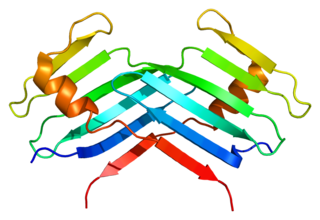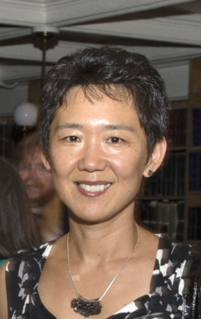Related Research Articles

Aurora kinase B is a protein that functions in the attachment of the mitotic spindle to the centromere.

Mitotic checkpoint serine/threonine-protein kinase BUB1 also known as BUB1 is an enzyme that in humans is encoded by the BUB1 gene.
Barbara J. Meyer is a biologist and genetist, noted for her pioneering research on lambda phage, a virus that infects bacteria; discovery of the master control gene involved in sex determination; and studies of gene regulation, particularly dosage compensation. Meyer’s work has revealed mechanisms of sex determination and dosage compensation—that balance X-chromosome gene expression between the sexes in Caenorhabditis elegans that continue to serve as the foundation of diverse areas of study on chromosome structure and function today.

Kinetochore protein NDC80 homolog is a protein that in humans is encoded by the NDC80 gene.

Anillin is a conserved protein implicated in cytoskeletal dynamics during cellularization and cytokinesis. The ANLN gene in humans and the scraps gene in Drosophila encode Anillin. In 1989, anillin was first isolated in embryos of Drosophila melanogaster. It was identified as an F-actin binding protein. Six years later, the anillin gene was cloned from cDNA originating from a Drosophila ovary. Staining with anti-anillin antibody showed the anillin localizes to the nucleus during interphase and to the contractile ring during cytokinesis. These observations agree with further research that found anillin in high concentrations near the cleavage furrow coinciding with RhoA, a key regulator of contractile ring formation.

ZW10 interactor (Zwint-1) is a protein that in humans is encoded by the ZWINT gene.

Serine/threonine-protein kinase PLK4 also known as polo-like kinase 4 is an enzyme that in humans is encoded by the PLK4 gene. The Drosophila homolog is SAK, the C elegans homolog is zyg-1, and the Xenopus homolog is Plx4.

Centromere protein I is a protein that in humans is encoded by the CENPI gene.

Protein MIS12 homolog is a protein that in humans is encoded by the MIS12 gene.
Iain Cheeseman investigates the role of the kinetochore, a group of proteins required for cell division and chromosome segregation. This core network of proteins facilitates the attachment of chromosomes to microtubule polymers—the spindle structures that attach to the ends of cells, pulling and dividing them during cell division. The kinetochore is critical to ensuring duplication without loss or damage to the genetic material. Cheeseman is also investigating the activities of the individual molecular machines that make up this structure and how these proteins are controlled and regulated.

Anthony Arie Hyman FRS is a British scientist and professor at the Max Planck Institute of Molecular Cell Biology and Genetics.
Joan S. Brugge is the Louise Foote Pfeiffer Professor of Cell Biology and the Director of the Ludwig Center at Harvard Medical School, where she also served as the Chair of the Department of Cell Biology from 2004 to 2014. Her research focuses on cancer biology, and she has been recognized for her explorations into the Rous sarcoma virus, extracellular matrix adhesion, and epithelial tumor progression in breast cancer.

Don W. Cleveland is an American cancer biologist and neurobiologist.

Rong Li is the Director of Mechanobiology Institute, a Singapore Research Center of Excellence, at the National University of Singapore. She is a Distinguished Professor at the National University of Singapore's Department of Biological Sciences and Bloomberg Distinguished Professor of Cell Biology and Chemical & Biomolecular Engineering at the Johns Hopkins School of Medicine and Whiting School of Engineering. She previously served as Director of Center for Cell Dynamics in the Johns Hopkins School of Medicine’s Institute for Basic Biomedical Sciences. She is a leader in understanding cellular asymmetry, division and evolution, and specifically, in how eukaryotic cells establish their distinct morphology and organization in order to carry out their specialized functions.

Carl H. June is an American immunologist and oncologist. He is currently the Richard W. Vague Professor in Immunotherapy in the Department of Pathology and Laboratory Medicine at the Perelman School of Medicine of the University of Pennsylvania. He is most well known for his research into T cell therapies for the treatment of cancer. In 2020 he was elected to the American Philosophical Society.
JoAnn Trejo is an American pharmacologist, cell biologist and professor in the Department of Pharmacology at the School of Medicine at University of California, San Diego. She is also the assistant vice chancellor for Health Sciences Faculty Affairs. Trejo studies cell signalling by protease-activated G protein-coupled receptors (GPCRs). She is also actively involved in mentoring, education and outreach activities to increase the diversity of science.
Valentina Greco is an Italian-born biologist who teaches at the Yale School of Medicine as the Carolyn Walch Slayman Professor of Genetics and is an Associate Professor in the Cell Biology and Dermatology departments. Her research focuses on the role of skin stem cells in tissue regeneration.
Trisha Nell Davis is an American biochemist, the current Earl Davie/ZymoGenetics Chair of the Department of Biochemistry at the University of Washington. Her early research focused on Calmodulin, though the primary focus of her lab has since shifted to the molecular machinery of cell division in budding yeast, especially the microtubule organizing centers and the kinetochores.

Pierre Gönczy is a Swiss and Italian cell and developmental biologist. His research focuses on centriole biology and asymmetric cell division. He is currently professor at École Polytechnique Fédérale de Lausanne (EPFL), where he directs the Laboratory of Cell and Developmental Biology.
Sophie Geneviève Elisabeth Martin Benton is a Swiss biologist who is Professor and Director of the Department of Fundamental Microbiology at the University of Lausanne. Her research investigates the molecular processes that underpin cellular fusion. She was awarded the EMBO Gold Medal in 2014.
References
- 1 2 "Karen Oegema Faculty Bio - Dept. of Cellular & Molecular Medicine - UC San Diego". UC San Diego Health Sciences. Retrieved 2017-11-26.
- 1 2 3 4 "Karen Oegema lab". Ludwig Cancer Research. Retrieved 2017-11-26.
- 1 2 3 4 5 6 7 8 "Research". Oegema Desai Lab. Retrieved 2017-11-26.
- 1 2 3 4 5 6 7 8 "Karen Oegema" (PDF). An International Forum for Cell Biology. January 2007.
- ↑ ""When I Was in Grad School…" with Arshad Desai". The BMS Times. 2016-08-16. Retrieved 2017-11-26.
- ↑ "Karen Oegema". Hyman Lab. Retrieved 2017-11-26.
- 1 2 "Karen Oegema". www.pewtrusts.org. Retrieved 2017-11-26.
- ↑ "Cancer Research Coordinating Committee Members". ucop.edu. Retrieved 2017-11-26.
- ↑ GoÈnczy Echeverri Oegema K Coulson Jones Copley Duperon Oegema Brehm Cassin Hannak Kirkham Pichler Flohrs Goessen Leidel Alleaume Martin Ozlu Bork Hyman (November 16, 2000). "Functional genomic analysis of cell division in C. elegans using RNAi of genes on chromosome III". Nature. 408 (6810): 331–336. Bibcode:2000Natur.408..331G. doi:10.1038/35042526. PMID 11099034. S2CID 4364278.
- ↑ Cheeseman, Iain M.; Niessen, Sherry; Anderson, Scott; Hyndman, Francie; Yates, John R.; Oegema, Karen; Desai, Arshad (2004-09-15). "A conserved protein network controls assembly of the outer kinetochore and its ability to sustain tension". Genes & Development. 18 (18): 2255–2268. doi:10.1101/gad.1234104. ISSN 0890-9369. PMC 517519 . PMID 15371340.
- 1 2 "WICB Awards - ASCB". ASCB. Retrieved 2017-11-26.